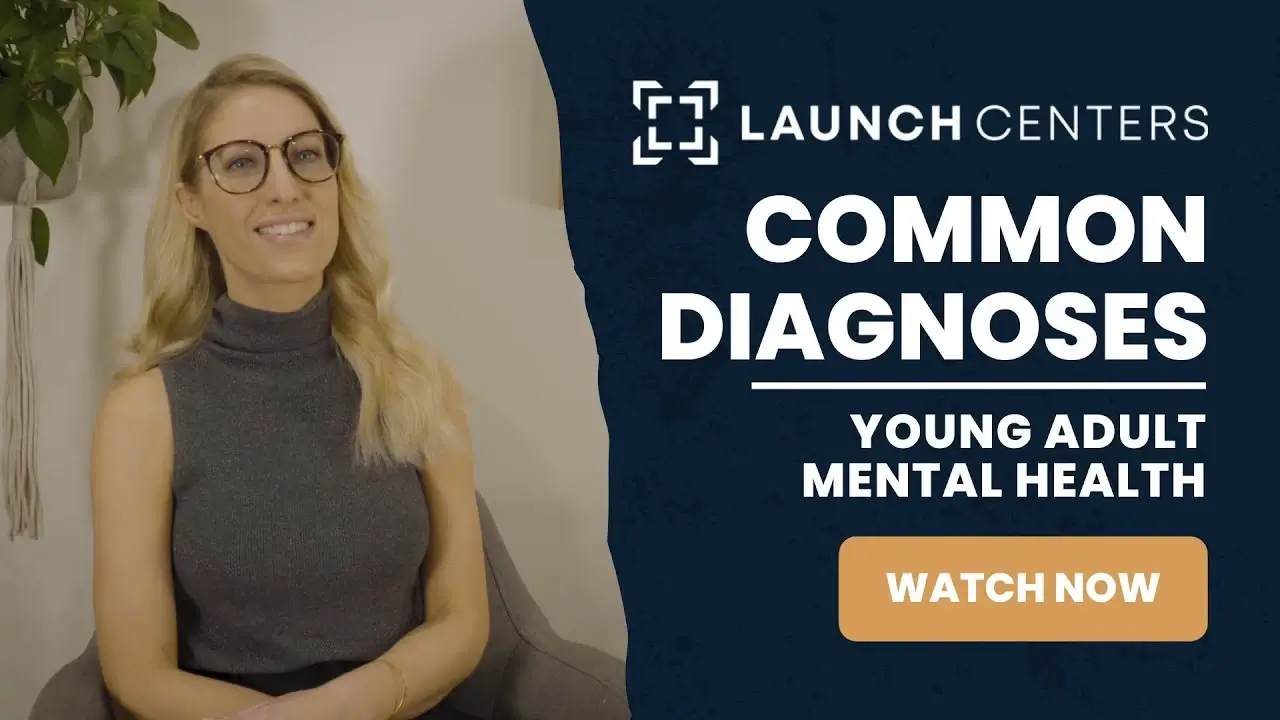
Dual Diagnosis Treatment For Young Adults In Los Angeles
Launch Centers is proud to offer individualized dual diagnosis treatment in Los Angeles for those struggling with co-occurring disorders and mental health issues. Our treatment facility is equipped with various programs, therapy models, and healing modalities to combat drug abuse, alcohol addiction, and mental health conditions like depression, anxiety, bipolar disorder, and more.
This page breaks down everything you need to know about dual diagnosis treatment and how Launch Centers tailors each treatment plan to meet your specific needs and goals toward wellness.
Table Of Contents
What Is A Dual Diagnosis?
A dual diagnosis refers to an individual dealing with a mental health disorder, such as depression, anxiety, or bipolar disorder, and an alcohol or drug addiction, which can interact with and worsen each other, making recovery more challenging to achieve and sustain. Launch Centers understands and incorporates dual diagnosis treatment into our outpatient and aftercare programs in Los Angeles.
Co-Occurring Disorders In The United States
- According to the National Institute on Drug Abuse (NIDA), individuals who have a drug addiction are twice as likely to experience mood and anxiety disorders.
- SAMHSA’s 2021 National Survey on Drug Use and Health found that around 9.2 million adults in the United States live with a co-occurring disorder.
- According to a study conducted by NIDA, individuals with severe mental illnesses are four times more likely to develop an alcohol addiction and five times more likely to smoke tobacco on a daily basis.
Are you ready to change your life?
Take action now.
The Science Behind Dual Diagnosis & Co-Occurring Disorders
Drug abuse and mental health disorders have a bidirectional relationship, with individuals with pre-existing mental health disorders using drugs or alcohol to cope with their symptoms. Unfortunately, the brain will form an association between substance abuse and feeling better and punish the body until it self-medicates again to attain a similar state of relief.
This can create a cycle of substance abuse that becomes increasingly difficult to break, eventually leading to bigger problems. Additionally, mind-altering substances can worsen mental illness symptoms and even interfere with the effectiveness of any prescribed medications for mental health disorders. Then, when the brain becomes self-aware of the addiction, the feelings of shame and failure can push the cycle forward to ignore the negative emotions.
At our dual diagnosis treatment center, we help clients understand the relationship between their substance abuse and mental health disorder. By gaining a deeper understanding of the connection between them, clients are able to better manage the two disorders.
Substance Use Disorders & Mental Health Disorders We Treat
Launch Center’s dual diagnosis treatment programs in Los Angeles recognize and are trained to address the following substance use and mental health disorders.
Mental Health Disorders
- Schizophrenia & Thought Disorders – Individuals with schizophrenia and other cognitive disorders may experience symptoms like paranoia, delusions, and hallucinations, which can severely impact their daily activities and functioning.
- Depression & Mood Disorders – Depression and other mood disorders can result in prolonged feelings of sadness, increase the likelihood of substance abuse, and lead to heightened moods that interfere with sleep and relaxation.
- Bipolar Disorder – Bipolar disorder causes sudden and major changes in mood that can affect a person’s capacity to perform their everyday duties and obligations.
- Personality Disorders – When a person has a personality disorder, it can result in persistent pessimistic thinking patterns, erratic actions, and challenges in maintaining positive and stable connections with others. Personality disorders include borderline personality disorders and antisocial personality disorder.
- Obsessive-Compulsive Disorder (OCD) –Obsessive-compulsive disorder is a mental condition characterized by repetitive and uncontrollable thoughts and compulsive behaviors such as hoarding, checking, and fear of contamination (mysophobia(.
- Anxiety Disorders – Excessive worry and fear caused by anxiety disorders can interfere with daily activities like school, work, and home life. It is important to address and manage these disorders to maintain a healthy lifestyle.

Substance Abuse Disorders
- Benzodiazepine Addiction – Benzodiazepines, such as Xanax or Valium, are sedative drugs that impact the nervous system. They are prescribed to individuals with depression, anxiety, chronic pain, insomnia, or seizures and can help alleviate symptoms for people detoxing from alcohol.
- Adderall Addiction – Adderall or Ritalin are prescribed stimulants used to treat attention deficit disorders like ADHD. They can be addictive if not taken as directed.
- Heroin Addiction– Heroin is a dangerous opioid that floods the brain with feel-good chemicals like dopamine and endorphins, which can cause individuals to focus all of their effort, time, and resources toward pursuing more heroin.
- Alcoholism – Alcohol use disorder (AUD) is a significant issue in the United States. According to the CDC, alcohol-related deaths claim the lives of over 88,000 Americans each year.
- Opioid Addiction – Opioids are potent, addictive medications with severe consequences for those who misuse them. Examples of opioids include oxycodone (OxyContin), hydrocodone (Vicodin), morphine, and methadone.
- Marijuana Abuse – With the legalization of recreational and medical marijuana in many states, the safety and addictive behaviors of cannabis remain a topic of debate.
- Crack/Cocaine Addiction – A 2006 National Survey on Drug Use and Health report revealed that over 35 million Americans over age 12 had used cocaine, and about 8.6 million Americans of the same age have reported using crack.
- Sleeping Pill Addiction – Because sleeping pills are legal prescriptions, people may be unaware of their risks. Individuals with insomnia may believe that sleeping pills cannot be addictive, but that is not true.
How We Treat Dual Diagnosis In Los Angeles, California
Our treatment center in Los Angeles offers various dual diagnosis programs and evidence-based therapy models.
Programs At Launch Centers
- Partial Hospitalization Program (PHP) – For individuals who need comprehensive mental health services but do not need to be hospitalized, PHP can be a suitable choice. These services are typically scheduled Monday through Friday and involve 8-hour treatment sessions per day.
- Intensive Outpatient Program (IOP) – IOP treatment allows clients to attend sessions part-time, which means they can take care of their other obligations while still receiving therapy. IOP sessions take place on weekdays and are divided into three-hour morning or afternoon sessions.
- Standard Outpatient Program (OP) – Typically, outpatient treatment requires fewer therapy sessions than other programs and helps individuals transition from a PHP or IOP to their regular daily routine.
- Detox – While Launch Centers doesn’t offer detox services directly, we collaborate with nearby detox centers and provide necessary resources to support individuals going through withdrawal symptoms.
Therapies At Launch Centers
- Life Skills and Career Development – Our dual diagnosis programs provide practical training in life skills and career development to enable individuals to regain lost abilities and transition to a healthy lifestyle.
- Cognitive-Behavioral Therapy (CBT) – Through CBT, we can help individuals identify and alter negative thinking patterns and beliefs that may exacerbate mental health disorders.
- Dialectical Behavior Therapy (DBT) – DBT is often employed in group therapy sessions to assist individuals in enhancing their emotional stability, mindfulness, stress management, and social skills.
- Experiential Therapy – By engaging in outdoor and creative activities, experiential therapy aims to promote mindfulness and encourage individuals to find alternative ways to experience happiness without relying on addiction.
- Eye Movement Desensitization and Reprocessing (EMDR) – EMDR utilizes bilateral stimulation to aid individuals in comprehending and resolving traumatic events and the mental illnesses linked to them.
- Trauma-Informed Care – Acknowledging the influence of trauma on an individual’s mental health and life is a crucial component of trauma-informed care, which includes its role in drug use, alcohol addiction, eating disorders, and other mental health disorders.
- Emotion-Focused Therapy (EFT) – EFT can assist individuals in exploring their emotions and those of their family and loved ones.
- Attachment Theory –By shedding light on how previous experiences may impact our emotional well-being and relationships, Attachment Theory is a valuable tool for understanding and healing.
Why Choose Launch Centers for Dual Diagnosis Treatment in Los Angeles
Here at Launch Centers, we base our dual diagnosis treatment services off of the eight pillars of our recovery programs. These include:
- Emotional Health: We want to help our clients learn how to navigate emotional stressors for improved well-being.
- Recovery Support: We help our clients develop strategies for relapse prevention for long-term recovery.
- Self Esteem & Self Worth: We seek to help our clients recognize their self-worth and build their self-esteem by reducing negative thinking patterns.
- Relationships and Community: We strive to build a community where clients can find support, acceptance, and encouragement.
- Values, Spirituality, & Identity: We aim to help clients gain a better sense of self by helping them identify their values and beliefs.
- Arts, Passions, & Creativity: We use creative outlets to help clients express their thoughts and emotions.
- Education & Career: We help clients build the skills they need to pursue their educational and career goals.
- Life Skills: We empower clients to feel confident navigating life independently.

Our Dual Diagnosis Treatment Center In Los Angeles
If you, a family member, or a loved one is struggling with a mental health disorder and substance use disorder, contact Launch Centers and ask about our dual diagnosis treatment plans. We take pride in offering the highest levels of care to individuals seeking addiction recovery and behavioral health treatment.
Our on-site clinicians are trained to address many types of mental disorders and addictions using multiple therapy types, all tailored to the exact needs of each client. If you have any general questions or want to know more about our programs, any of our admissions staff can help.


